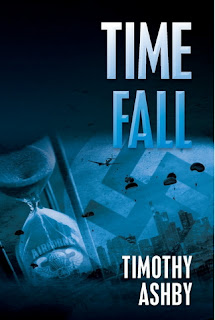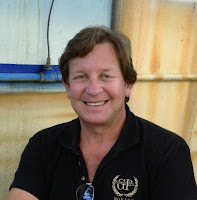 Time Fall
Time Fall
By: Timothy Ashby
Publisher: Self-Published
Published: Feb. 22, 2013
Genre: Historic Fiction
Tim is having a giveaway for a copy of Time Fall over at his site.
Lt. Art Sutton’s team of six US Rangers parachute into Nazi Germany… but they vanish in 1945. They land, a few minutes later, in 2011. The Rangers are unaware of the passage of time all around them and the valiant, misguided soldiers begin to attack “enemy” targets.
They face the age old question – What is good? What is evil?
Roth gripped Sutton’s jacket to drag him from the aperture in the fence.
As Sutton cleared the wire, he rolled onto his belly. Roth’s helmet tapped against his, the elongated barrel of the sergeant’s silenced pistol inches from Sutton’s face.
“I will take care of him,” Roth whispered.
“Only if he sees the hole,” hissed Sutton. “You can’t risk a shot from this position.”
The footsteps came closer, scuffing the gravel. Sutton pressed into the ground, trying, as the commando instructors had taught him, to imagine himself part of the landscape. Roth lay so close that the hot air from his lungs warmed Sutton’s face.
Sutton allowed only his eyes to move, flicking between the tread of the sentry’s boots to Roth’s pistol. He noticed the sergeant’s hand trembling.
Boots less than two yards away. The sentry trudged nearer, steps erratic, scattering gravel chips. A pebble clinked against Sutton’s steel helmet.
The sentry was almost in front of them now, tan boots and camouflage trousers in sharp detail, face shadowed by the Nazi helmet’s rim. The boots dragged again, then halted directly in front of the hole cut through the fence.
Sutton saw Roth’s hand steady as he took aim at the sentry’s head. They heard the click of what sounded like a lighter. The pungent odor of cigarette smoke filled the air. Sutton thought it seemed impossible that the sentry would risk possible intruders seeing the red glow of his cigarette—the camp was supposed to be under blackout.
The sentry suddenly began speaking. Roth’s tightening trigger finger froze. He and Sutton glanced at each other in disbelief as they heard the man softly recite what sounded like an incoherent poem in fractured English while shuffling in a strange dance routine:
Yo, I’m runnin’ through these yo’s like Drano I got that devilish flow, rock ‘n’ roll, no halo We party rock, yeah, that’s the crew that I’m reppin’ On the rise to the top, no lead in our zeppelin, hey
The sentry made some whooshing noises, nodded his head, then threw the butt of his cigarette to the ground and mashed it with his boot. He yawned, seemed to adjust something on his ears under the helmet, then bobbed away.
Sutton realized that he had been holding his breath. He expelled it as the tread of the sentry’s boots faded. There was no time to consider the man’s odd behavior now. He slithered back up to the opening in the wire and propelled himself through, rising without breaking motion into a crouching run that brought him to the deep shadows under the wall of a building. The Rangers behind him hurled themselves against the wall at five-second intervals.”
Sutton darted from the sheltering wall. The vehicle park was surrounded by a rusted mesh fence – an unnecessary precaution, as the huge double gate yawned wide, one side crumpled as if a careless driver had collided with it. The repaired vehicles were segregated into columns of tanks, trucks and personnel carriers. Lampposts cast ineffectual pools of light at wide intervals, illuminating olive drab paint, white stars, and the large, stenciled letters US ARMY.
Sutton skidded to a halt, wondering if his eyes were deceiving him. He heard the gasping breaths of the other men as they slid against the wall beside him.
“What is it?” Roth asked. He saw the vehicles. So did the other four men.
“Holy cow!” someone hissed.
“What in the world?–”
“Silence!” Roth snapped. He moved closer to Sutton.
“What gives, Lieutenant? These are all American vehicles.”
“Don’t know,” Sutton said. “The briefing officers said nothing about this.”
He studied the ranks of machines, bafflement growing. He pointed at a row of tanks, their cannon barrels raised like a lancer’s salute.
”Never seen tanks like those before. They can’t be ours, or British for that matter.”
Roth grunted an assent. “They look more like German King Tigers – the Panzerkampfwagen Six. Must be a new type that our intelligence doesn’t know about yet.” Roth thrust his jaw towards the parking area. “Most of the other vehicles are unknown to me also. But why are they all painted to look like Americans?”
Something nagged at Sutton’s mind, a memory of an article in Stars and Stripes, a story given substance by conversations with men who had served in the Battle of the Bulge five months earlier.
“It’s a Kraut trick. Armored columns painted to look like they’re Americans. They used that trick at the Bulge last Christmas. Really fooled our guys. Even had English-speaking Krauts in our uniforms.”
“I’ll be…,” Sarnoff muttered. “I remember hearing about that from a guy who was at Bastogne. Dirty Nazis!”
“Our fighter pilots will sure think twice before attacking ’em,” Sutton added. “Let’s make sure they never get out of here! Rendezvous where we left our gear in fifteen minutes.”
An international lawyer, businessman and writer, Tim Ashby worked in Washington DC as a counter-terrorism consultant to the U.S. State Department, and then as a senior official – the youngest political appointee of his rank – at the U.S. Commerce Department, responsible for commercial relations with Latin America and the Caribbean. He held two Top Secret security clearances and worked with a number of colorful characters, including members of the U.S. military’s Joint Special Operations Command (JSOC). He has lived in the Caribbean and Europe as well as various places in the United States. An avid historian, he published widely on military history, archaeology, business and international relations. A licensed attorney in Florida and the District of Columbia, Tim Ashby has a PhD degree from the University of Southern California, a JD from Seattle University Law School, and an MBA from the University of Edinburgh Scotland.









Thank you so much for sharing an excerpt from Time Fall. I love the layout you use for your posts and hope your blog visitors will enjoy this fascinating book – the research and detail are great.
You’re welcome. It’s sounds like a good read with the time traveling and all the confusion that it brings for the guys.